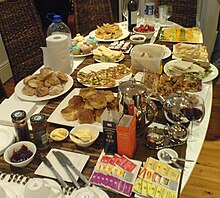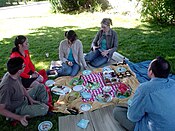Outline of meals
| Part of a series on |
| Meals |
|---|
 |
| Meals |
| Components and courses |
| Related concepts |

A meal is an eating occasion that takes place at a certain time and includes specific, prepared food, or the food eaten on that occasion.[1][2] The names used for specific meals in English varies greatly depending on the speaker's culture, the time of day, or the size of the meal.
Meals occur primarily at homes, restaurants, and cafeterias, but may occur anywhere. Regular meals occur on a daily basis, typically several times a day. Special meals are usually held in conjunction with such occasions as birthdays, weddings, anniversaries, and holidays. A meal is different from a snack in that meals are generally larger, more varied, and more filling than snacks.[3]
Common meals
Mealtimes
The type of meal served or eaten at any given time varies by custom and location. In most modern cultures, three main meals are eaten: in the morning, early afternoon, and evening. Further, the names of meals are often interchangeable by custom as well. Some serve dinner as the main meal at midday, with supper as the late afternoon/early evening meal; while others may call their midday meal lunch and their early evening meal supper. Except for "breakfast", these names can vary from region to region or even from family to family.
- Breakfast is eaten within an hour or two after a person wakes in the morning.[4]
- Lunch or dinner is eaten around mid-day, usually between 11 am and 2 pm. In some areas, the name for this meal depends on its content.[5]
- Supper or dinner is eaten in the evening. In some areas, the name for this meal depends on its content, but many English-speakers use "dinner" for this meal regardless of size.[6]
Other types of meals


- A barbecue is a meal at which food (often meat or fish) is cooked out of doors on an open fire or portable grill.[7]
- A banquet is a large, formal, elaborate meal, with many guests and dishes.[8]
- A blue-plate special is a term used in the United States by restaurants that refers to a specially low-priced meal, usually changing daily.
- Brunch is a late-morning meal, usually larger than a breakfast and usually replacing both breakfast and lunch; it is most common on Sundays. Brunch originated in England in the late 1800s, and in the 1930s became popular in the United States.[9]
- A buffet typically involves diners serving themselves from foods placed in a public area. Buffets are effective for serving large numbers of people at once, and are often seen in institutional settings, such as business conventions or large parties. Some restaurants also offer buffets, such as a lunch buffet, or are specifically buffet restaurants.
- Elevenses, also called "morning tea", is a light snack[10] and drink taken in the late morning after breakfast and before lunch.
- A last meal is a meal served to a prisoner before his execution.[11]
- A multicourse meal is a meal of multiple dishes served in sequence.
- A full course dinner in its simplest form, can consist of three or four courses, such as soup, salad, meat and dessert. In formal dining, a full course dinner can consist of many courses, and in some instances the courses are carefully planned to complement each other gastronomically.
- A main course is the featured or primary dish in a meal consisting of several courses. It usually follows the entrée ("entry") course. In the United States it may in fact be called "entree".
- Meals on Wheels are meals delivered as a service to the homes of people who are unable to prepare their own.[12]
- A picnic is an outdoor meal where one brings one's food, such as a sandwich or a prepared meal (sometimes in a picnic basket). It often takes place in a natural or recreational area, such as a park, forest, beach, or lawn. On long drives a picnic may take place at a roadside stop such as a rest area. Picnics are often consumed on a picnic table.
- A potluck is a gathering of people where each person or group of people may contribute a dish of food prepared by the person or the group of people, to be shared among the group.
- Second breakfast is a traditional mid-morning meal served in parts of central Europe, i.e.: Austria, Bavaria (Germany) and Poland.
- Tea can refer to any of several different meals or mealtimes, depending on a country's customs and its history of drinking tea. However, in those countries where the term's use is common, the influences are generally those of the former British Empire (now the Commonwealth of Nations). Tea as a meal can be small or large.
- Afternoon tea is a mid-afternoon meal, typically taken at 4 pm, consisting of light fare such as small sandwiches, individual cakes and scones with tea.[13]

- Tiffin is a second breakfast or light lunch,[14] most commonly in India. "Tiffin" can also refer to boxed or packaged lunches that are delivered by dabbawalas in Mumbai to workers in the city.[15]
- Réveillon is a celebratory long dinner held on Christmas Eve in French-speaking countries.
- Sacred meals, such as the Eucharist, a form of theophagy or symbolic rite.
- Symbolic meals, such as were prepared for or represented in tombs, were designed for consumption by the deceased in the after-life. They are often represented in funerary art.
- A wedding breakfast is a dinner given to the bride, bridegroom, and guests at the wedding reception that follows a wedding in the United Kingdom, Australia, Germany, Austria and Scandinavia.
- Rehearsal dinner – a pre-wedding ceremony in North American tradition, usually held after the wedding rehearsal and the night before the wedding ceremony.
- Yum cha is a Cantonese morning or afternoon meal where dim sum dishes[16] and tea are served. In the U.S. and U.K., the word dim sum is often used in place of yum cha.
-
Simple meals often consist of bread and/or meat Albert Anker, Still life Excess (1896)
-
Afternoon tea
-
Brunch foods
-
People enjoying a picnic
See also
Types of meals
- Airline meal
- Ambigu (meal)
- Baconique meal
- Box lunch
- Break fast
- Buffet / Smörgåsbord
- Bull roast
- Cawl
- Chhota haazri
- Collation (meal)
- Dal bhat
- Deipnon
- Eid al-Fitr
- Family meal
- Fish fry
- Free lunch
- Full breakfast
- Futurist meals
- Hog fry
- Iftar
- Jiggs dinner
- Kaiseki
- Kids' meal
- Maahefun
- Midnight breakfast
- Mixed grill
- New England boiled dinner
- Pig roast
- Ploughman's lunch
- Rijsttafel
- Saapadu
- School meal
Meal structure in cuisines
- Meal structure in Arab cuisine
- Meal structure in Aztec cuisine
- Meal structure in Bengali cuisine
- Meal structure in Danish cuisine
- Meal structure in Dutch cuisine
- Meal structure in English cuisine
- Meal structure in French cuisine
- Meal structure in German cuisine
- Meal structure in Iraqi cuisine
- Meal structure in Italian cuisine
- Meal structure in Moroccan cuisine
- Service à la française
- Service à la russe
Related terms and concepts
References
- ^ meal noun (FOOD) - definition in the British English Dictionary & Thesaurus - Cambridge Dictionaries Online
- ^ meal - Definition from Longman English Dictionary Online
- ^ Attention: This template ({{cite doi}}) is deprecated. To cite the publication identified by doi:10.1016/j.appet.2009.09.016, please use {{cite journal}} (if it was published in a bona fide academic journal, otherwise {{cite report}} with
|doi=10.1016/j.appet.2009.09.016instead. - ^ "AskOxford: breakfast". Retrieved 2008-07-20.
- ^ "AskOxford: lunch". Retrieved 2008-07-20.
- ^ "Definition of supper". Retrieved 2012-07-10.
{{cite web}}: Unknown parameter|deadurl=ignored (|url-status=suggested) (help) - ^ O'Donoghue, Ben (2008), Outdoor: grill your way 'round the world, Prahran, Victoria, Australia: Hardie Grant Books, ISBN 9781740665599
- ^ "Banquet." (definition). Merriam-webster.com. Accessed August 2011.
- ^ Rombauer, Irma S.; Becker, Marion Rombauer; Becker, Ethan (2001). Joy of Cooking: All About Breakfast and Brunch. Simon and Schuster. p. 8. ISBN 0743206428.
{{cite book}}: CS1 maint: multiple names: authors list (link) - ^ A & C Black Publishers Ltd (2009). Dictionary of Leisure, Travel and Tourism. A & C Black Publishers Ltd. p. 103. ISBN 1408102129.
- ^ (AP) (August 29, 2012). "Study: Death Row inmates pick comfort foods for last meals". CBS News. Retrieved 22 December 2013.
- ^ Meals on Wheels Inc. (S. Aust.) (1963), Meals on Wheels : what it is - how it began - what it is now - what it can become!, Meals on Wheels
- ^ a b "AskOxford: tea". Retrieved 2008-07-20.
- ^ "Definition of tiffin in English". Oxford Dictionaries. Retrieved 22 December 2013.
- ^ Narsimhan, Mahtab (2011). Tiffin (abstract). Midpoint Trade Books Incorporated. ISBN 1770860398.
- ^ Sterling, Richard; Chong, Elizabeth; Qin, Lushan Charles (2001). Hong Kong. Lonely Planet. p. 145. ISBN 1864502886.
{{cite book}}: CS1 maint: multiple names: authors list (link)
Further reading
- Flandrin, Jean Louis (2007). Arranging the Meal: A History of Table Service in France. University of California Press. ISBN 0520238850
- Latham, Jean (1972) The pleasure of your company: a history of manners & meals, London: A. and C. Black. ISBN 0713612649
- Pollan, Michael (2006). The Omnivore's Dilemma: A Natural History of Four Meals. Penguin. ISBN 1594200823
- This, Hervé (2009). Building a Meal: From Molecular Gastronomy to Culinary Constructivism. Columbia University Press. ISBN 0231144660
External links
- “What Time is Dinner?” – a historian looks at the evolution of mealtimes.
- “Small meals or big ones?” – a comparison of the number of meals taken per day.




